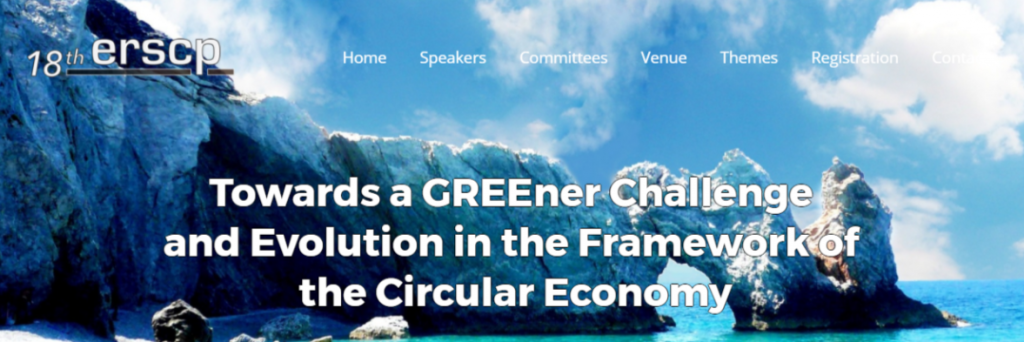KATCH_e was at the 18th European Roundtable on Sustainable Consumption and Production
The conference took place in the beautiful Greek island of Skiathos earlier this month and some of the KATCH_e partners organized a special session on sustainable design and circular economy, held on the 4th October 2017.
 From the KATCH_e consortium, LNEG, AIE, ITC, Prospektiker and VUT attended and in total there were some 25 people in the room.
From the KATCH_e consortium, LNEG, AIE, ITC, Prospektiker and VUT attended and in total there were some 25 people in the room.
 The first hour was dedicated to presentations. David Camocho (LNEG, PT) introduced the KATCH_e project, followed by Rainer Pamminger (VUT, AT), who presented the development and test of a Design for Sustainability training program for vocational education and training in Austria. Oihana Hernaez (Prospektiker, ES) addressed the theme of collaboration among businesses and stakeholders for accelerating transition to circular cities. And finally an overview of the training needs, state of the art, trends and policies related to introducing circular economy into higher-education design curricula (which was one of the first KATCH_e’s activities) was done by Irina Celades, ITC (ES).
The first hour was dedicated to presentations. David Camocho (LNEG, PT) introduced the KATCH_e project, followed by Rainer Pamminger (VUT, AT), who presented the development and test of a Design for Sustainability training program for vocational education and training in Austria. Oihana Hernaez (Prospektiker, ES) addressed the theme of collaboration among businesses and stakeholders for accelerating transition to circular cities. And finally an overview of the training needs, state of the art, trends and policies related to introducing circular economy into higher-education design curricula (which was one of the first KATCH_e’s activities) was done by Irina Celades, ITC (ES).
During the second hour, attendees were invited to two breakout groups.
Group 1, moderated by Rainer Pamminger, discussed circular strategies in the construction sector.
The long lifetime of buildings and missing strategies for reducing material intensity are major problems in the construction sector; the waste generated at the end of life stage of the buildings is huge and the application of a circular approach that can reduce this waste seems difficult at the moment. So the questions posed to the group were:
1. What kind of circular business models could give a solution to the problems associated to the waste generation and demolition of buildings? How to make the construction sector more circular, especially on the end of life stage of the buildings?
2. What factors should be considered within the design process of construction materials and buildings?
3. What kind of stakeholders should be involved when trying to develop these circular business models?
 Group 1 participants
Group 1 participants
Group 2, moderated by Irina Celades, discussed the challenges related to integrating circular economy principles and approaches in university curricula.
The main point of debate in this group was the gap between universities’ offers and industry needs. Case studies and practical examples are key to bridge them. It was also recognized that there is a need to change how curricula are currently developed. As it is right now, it is difficult to integrate this new subject of circular economy.
The full report of the workshop will soon be available.
